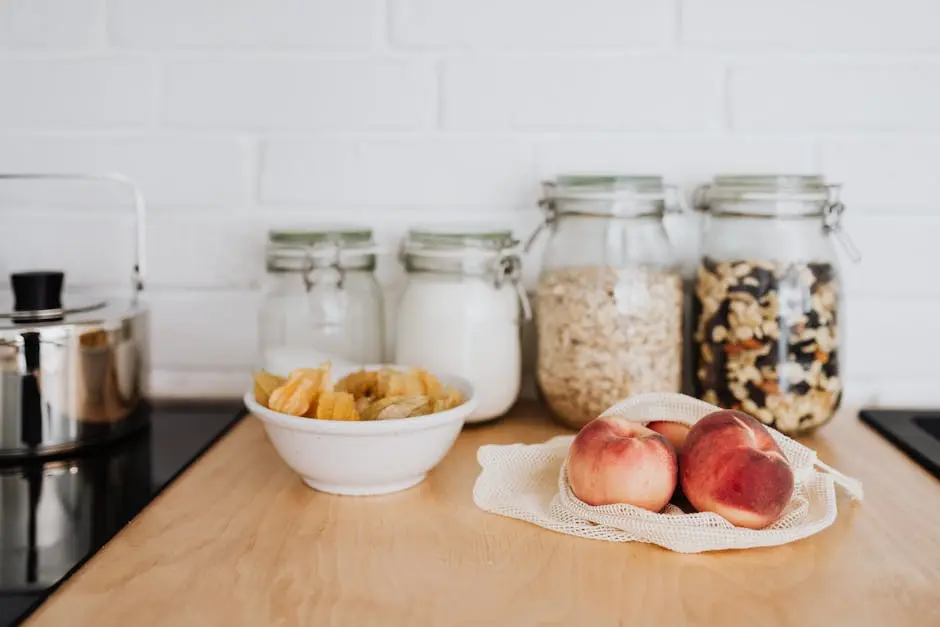info@baysideclosets.com

Eco-Friendly Kitchen Pantry Ideas for Sustainable Living
Creating an eco-friendly kitchen pantry is a wonderful step towards sustainable living. By making mindful choices about how we store and use food, we can reduce waste, save money, and contribute to a healthier planet. Let’s explore some simple yet effective ideas to transform your kitchen pantry into a sustainable haven.
Opt for Glass or Stainless Steel Containers
Replacing plastic storage containers with glass or stainless steel is a great way to reduce plastic waste. These materials are not only durable and recyclable but also keep food fresh for longer periods. Glass containers, such as Mason jars, are perfect for storing grains, spices, and other pantry essentials due to their transparency, which allows you to see when supplies are running low. While plastic is a prevalent choice for storage, opting for glass ensures environmental friendliness and helps you stay informed about your stock levels 10 Easy, Eco-Friendly Pantry Ideas.
A significant benefit of using these durable containers is their ability to maintain the quality of food items. Stainless steel, for example, is impervious to air and moisture, making it especially favorable for storing dry goods. When properly sealed, these containers can keep produce fresher for extended durations, reducing the carbon footprint from frequent grocery trips. Additionally, being microwave and dishwasher safe, these materials contribute to less household cleaning time while ensuring that harmful plastic particulates aren’t introduced into your meals.
Notably, using glass and steel in your pantry isn’t just about thoughtful organization—it’s a conscious step toward sustainable living. By switching over from single-use plastics, you’re not only preserving the nutritional quality of your ingredients but also reducing landfill burden. Researching into responsible brands that create eco-friendly packaging can further guide you in making informed choices. Incorporating these conscientious recycling habits in your kitchen pantry makes for a cleaner, more sustainable future.
Bulk Buying and Storing
Purchasing food items in bulk reduces packaging waste and is often more cost-effective. Invest in reusable cloth bags and airtight containers for storing bulk items like grains, nuts, and spices. Not only does this practice minimize excess packaging, but it also allows for better kitchen organization. Buying in bulk can often lead to savings, which is an added perk to taking these greener initiatives.
When transitioning to a bulk buying strategy, the key to maintaining efficiency is in organization. Labeling is an essential part of the process, keeping your items neatly categorized and preventing over-purchasing. Consider using glass jars or stainless steel cans to store items, which will help in keeping the kitchen tidy and allowing you to spot low supplies at a glance. Moreover, ample labeling helps prevent inadvertent food wastage, pivotal in maintaining a sustainable lifestyle.
Storing bulk purchases demands creativity and planning. Designing a custom pantry that accommodates your bulk items can be wonderfully beneficial Why Custom Pantries Are a Great Decision. A tailored pantry ensures your space is utilized well, enhancing access to stored goods while keeping clutter at bay. Customized storage solutions are not just practical; they can greatly increase home value, making this investment rewarding.
Compostable and Reusable Bags
Utilize compostable bags for perishables and invest in reusable shopping bags to minimize single-use plastic. This small switch can significantly cut down the amount of waste generated in your kitchen. Compostable bags offer a sustainable alternative as they break down naturally, leaving no harmful residues behind.
Reusable bags also play a crucial role in reducing our reliance on plastic. These sturdy alternatives often come in a variety of materials such as cotton or hemp, long outliving single-use plastics. Ensuring you have an ample supply of these bags can elevate your sustainable pantry practices, reducing your weekly grocery trip’s environmental impact.
Additionally, by using these eco-friendly bag options, you contribute significantly toward global conservation efforts. Making this shift not only aids the environment but aligns with the growing demand for sustainable choices in our communities. The subtle change can inspire others to follow suit, collectively amplifying our efforts to maintain a healthier planet.
Labeling for Efficiency
Organizing your pantry with clear labeling can prevent food spoilage. Use chalk labels or eco-friendly sticker labels to keep track of expiration dates and reduce food waste. Clear labeling acts as a guide, transforming your pantry into an area of ease and functionality that not only contributes to food preservation but also enhances meal preparation.
Investing time in labeling effectively is key. For example, categorizing herbs, grains, and spices with their purchase dates offers clarity, utilizing a first-in-first-out practice which ensures older items are used before newer ones. Such practices drastically cut down on unused expirations and are pivotal in reducing food waste 10 Easy, Eco-Friendly Pantry Ideas.
Furthermore, integrating labels into your kitchen can seamlessly translate into a smoothly operating pantry. By labeling both pantry fittings and bulk storage, you not only expedite meal prep, but you pave the way for an unconsciously efficient use of resources. A minimal effort with sizable returns keeps your kitchen not just sustainable but also efficient.
DIY Natural Cleaning Solutions
Keep your pantry clean using DIY natural cleaning solutions. Ingredients like vinegar and baking soda are effective and free of harmful chemicals, ensuring a safe food storage environment. Steering clear of severe chemicals is essential, particularly around food storage areas, to maintain a healthy home atmosphere.
Natural solutions, such as a mixture of lemon juice and coarse sea salt, make excellent scrubbers for removing residual stains from containers, while essential oils can add a pleasing aroma to your cleanups. Simple eco-friendly cleaning recipes not only safeguard health but can also prove to be economical in the long run. These practices weave into the whole ethos of an eco-friendly kitchen 10 Easy, Eco-Friendly Pantry Ideas.
Opting for natural cleaning agents is another layer of sustainable living. This approach to cleanliness extends beyond the pantry, setting a standard for maintaining a toxin-free home environment. It is an uncomplicated adjustment that holds the power to transform your home’s eco-conscious practices, marrying the ideas of sustainability with day-to-day practicality.
Embrace a Greener Pantry
Making small, sustainable changes in your kitchen pantry can have a significant impact on the environment. By embracing eco-friendly practices, you’ll not only contribute to a healthier planet but also create a more organized and efficient kitchen space. Begin by assessing your current habits and take steps to implement these eco-friendly ideas. Remember, every little change counts!



